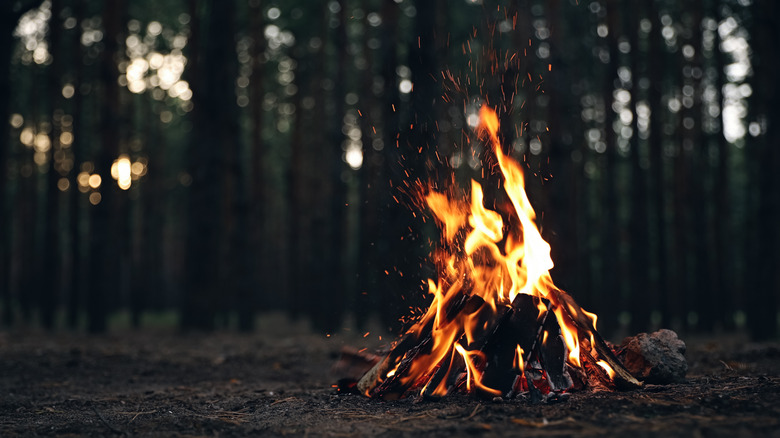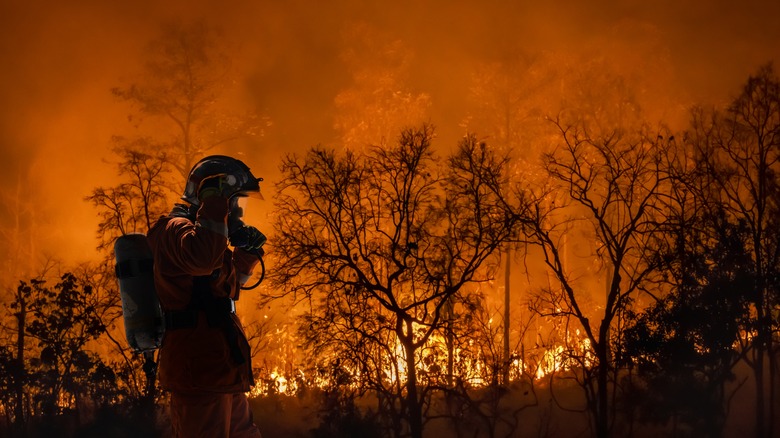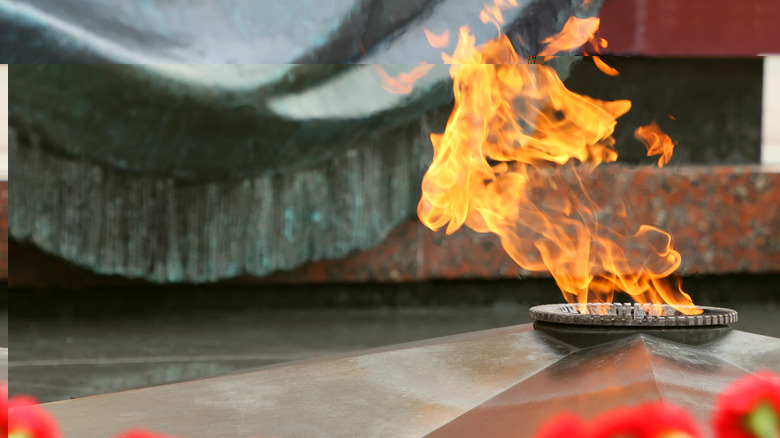What Happens If Fires Aren't Put Out?
We all know how dangerous fire is, and how essential it's been for human history and survival. Simply put, without mastery of fire, there is no humanity as we know it. As Smithsonian Magazine explains, the use of fire allowed our distant ancestors to spend more time on the ground and not up in the trees. Nocturnal predators got scared off, bipedalism evolved, our hands got freed up for tools, more energy got devoted to the brain and not the limbs, and presto — we're playing instruments, driving cars, typing emails, and hammering nails. Cooked food also yields more energy than raw food overall, which fueled the development of the human brain. And yet, fire remains just as dangerous as ever. It gobbles up forests, consumes property, and devours flesh. And if not put out, it can burn and burn practically forever.
As a refresher, fire needs three elements to start and burn: fuel, oxygen, and heat. Or as Smokey Bear concisely says, fires start "whenever combustible fuel in the presence of oxygen at an extremely high temperature becomes gas." Fires — even wildfires — can occur naturally without human intervention, but the Western Fire Chiefs Association says that 90% of wildfires are manmade. Fire itself — the wavering, hot orangish-yellow stuff — is just the visible evidence of ignited gas. Without fuel a fire will die out naturally. But so long as there's a fuel source, a fire will continue to burn, even over thousands of years.
Fuel sources keep a fire going
Thankfully, even though fires can burn eternally, most die by themselves and don't need to be put out. If left alone fires will cool and dwindle as soon as any one of their fuel sources is gone — either oxygen or combustible materials. Looking at house fires, firefighter Robert Vahle says on Quora that an entire house can be consumed in flames in a matter of minutes. Fires last longer or shorter lengths of time depending on the amount of fuel available, how easily the fire moves between fuel sources, what airflow is like, etc. If the fire doesn't spread to other structures it'll vanish as soon as the house is gone. Angi says that a home can completely burn down in an hour.
By contrast, the Western Fire Chiefs Association says that wildfires in 2013 lasted 37 days on average — a global warming-exacerbated figure up from eight days in 1986. That's plenty of time to do massive damage to an ecosystem, let alone human habitation. And yet, some ecologists believe that it's better to let fires die naturally. Reason being, fires remove brush and tinder that can cause even more damage down the line if ignited in more intense fires. Firewood for Life says that a simple, controlled campfire might take up to 24 hours to cool to embers — provided it isn't fed additional combustible material. But to prevent the fire from spreading, it should always be put out.
Eternal flames
To dig deeper into what keeps a fire going, we can look at the methods we use to put them out. Fire extinguishers smother fuel and remove oxygen from the equation, as well as reduce a fire's heat. This is why you're supposed to point extinguishers at the base of a fire and sweep back and forth to cloak the fuel source in foam. Water puts fires out because it's so good at absorbing heat. It takes a lot of heat to break the molecular bonds of water, and before then the water will change states to steam.
On rare occasions we can glimpse what happens if a fire is left to burn and doesn't run out of fuel. Take the "Gates of Hell" in Turkmenistan, per Insider: The result of a Soviet drilling accident in 1971 that left a huge, ever-burning crater in the middle of the Karakum Desert. The crater continues to burn methane at 207 degrees Fahrenheit to this day and has never gone out. Other fires stay lit because people tend to them, like the Behram Fire in the Zoroastrian Fire Temple of Yazd in modern-day Iran. The Behram Fire predates the birth of the prophet Mohammed by about 100 years and has burned continuously for over since 470 C.E. during the region's Sasanid Dynasty, as Apochi says — over 1,500 years. Eventually though, given enough time, all fires will die.


